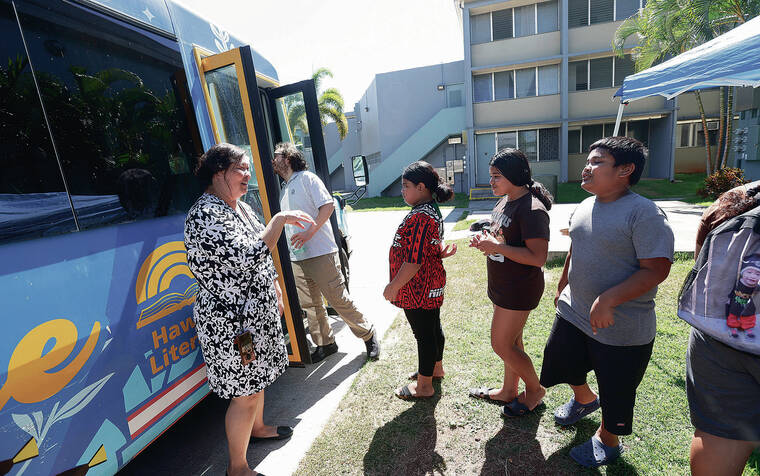Education
Hawaii Faces Literacy Crisis Despite Historical Achievements

Hawaii’s rich history as one of the most literate societies in the 19th century starkly contrasts with the current challenges facing tens of thousands of adults in the state. Many struggle with basic reading and writing skills, which are essential for participating fully in family life, the workforce, and civic engagement. Advocates warn that without immediate and coordinated investment, low literacy rates will continue to hinder Hawaii’s economy, strain healthcare systems, and perpetuate intergenerational poverty.
According to Jill Takasaki Canfield, executive director of Hawaii Literacy, approximately 17% of adults in Hawaii face difficulties with basic reading skills, with certain communities experiencing rates as high as 25%. This statistic, while better than the national average of 22%, still indicates that tens of thousands of adults can read only at a third-grade level or lower. Such limited skills impede their ability to complete essential tasks like filling out forms, applying for jobs, or assisting their children with homework.
The figures from Hawaii align with findings from the U.S. Program for the International Assessment of Adult Competencies, which indicates that Hawaii is lagging behind in adult literacy compared to the national average. Nationally, about 59 million U.S. adults live with very low literacy skills, which significantly affects their capacity to perform everyday tasks.
Community leaders assert that the need for literacy intervention is particularly acute in low-income and immigrant neighborhoods, where the demand exceeds the statewide averages. Pua‘Ena Burgess, who oversees Hawaii Literacy’s bookmobile outreach, highlighted the local demand through their monthly visits to various sites, primarily concentrated in Waianae and Nanakuli, with additional stops in Honolulu and Hawaii Island. The bookmobile serves approximately 8,000 children and adults each year, providing access to resources that are often scarce.
On a recent Wednesday, resident Antoinette Anoc visited the bookmobile with her seven-year-old son, Dominic. She emphasized that these visits do more than provide books; they foster trust between families and educational resources, help keep children engaged, and offer an affordable alternative to costly after-school programs. “It brings the community together,” Anoc noted, highlighting the role of organized activities in preventing youth violence and providing constructive outlets for children.
The economic implications of low literacy are profound. Brandon Kurisu, a workforce advocate, bluntly stated that low literacy is detrimental to Hawaii’s economy. Adults with the lowest literacy skills are twice as likely to be unemployed and earn significantly less than their literate counterparts. This situation contributes to a shrinking talent pool in vital sectors such as healthcare, tourism, and renewable energy. Studies indicate that children of low-literacy parents often begin school at a disadvantage, perpetuating a cycle of poverty.
A report from the University of Hawaii Economic Research Organization on the Good Jobs Hawaii program revealed that participants who completed training saw an average increase of $1,800 in real quarterly wages, equating to about $7,200 annually. Such findings illustrate the economic benefits of equipping residents with necessary skills, particularly in basic literacy.
Efforts to combat low literacy are ongoing. Hawaii Literacy collaborates with various community partners to implement programs that include one-on-one adult tutoring, family literacy libraries, and digital literacy instruction. The organization has historically served around 40,000 adults and youth through its initiatives. Canfield explained that the nonprofit tracks various metrics, such as skill gains and learner success, to demonstrate progress in both literacy and workforce readiness.
While the bookmobile serves as a critical entry point for many families into literacy resources, challenges remain. Funding uncertainty, staff shortages, and limited capacity to measure outcomes hinder the scale of these programs. Canfield noted that fundraising cuts often restrict their ability to evaluate deeper outcomes across the board.
Community engagement from local businesses is vital. Kurisu pointed to instances where employers investing in workplace literacy and digital skills have seen measurable returns, including reduced turnover and increased productivity. The private sector in Hawaii, which relies on a skilled workforce for various industries, has a vested interest in expanding literacy partnerships.
“Raising literacy is not just a social responsibility; it is an economic imperative,” Kurisu stated. He emphasized that every dollar invested in literacy contributes to Hawaii’s future workforce and economic competitiveness. Hawaii Literacy tracks key metrics that resonate with donors and corporate partners, including numbers served and success stories. However, there is potential for greater involvement from employers in funding programs and facilitating workplace classes that enhance basic literacy and digital competencies.
The situation in Hawaii serves as a reminder that while historical achievements in literacy are commendable, the ongoing challenges require urgent action and collaboration among community leaders, educators, and businesses to secure a more literate and economically resilient future for all residents.
-

 Technology5 months ago
Technology5 months agoDiscover the Top 10 Calorie Counting Apps of 2025
-

 Health3 months ago
Health3 months agoBella Hadid Shares Health Update After Treatment for Lyme Disease
-

 Health3 months ago
Health3 months agoErin Bates Shares Recovery Update Following Sepsis Complications
-

 Technology4 months ago
Technology4 months agoDiscover How to Reverse Image Search Using ChatGPT Effortlessly
-

 Technology1 month ago
Technology1 month agoDiscover 2025’s Top GPUs for Exceptional 4K Gaming Performance
-

 Technology3 months ago
Technology3 months agoElectric Moto Influencer Surronster Arrested in Tijuana
-

 Technology5 months ago
Technology5 months agoMeta Initiates $60B AI Data Center Expansion, Starting in Ohio
-

 Technology5 months ago
Technology5 months agoRecovering a Suspended TikTok Account: A Step-by-Step Guide
-

 Health5 months ago
Health5 months agoTested: Rab Firewall Mountain Jacket Survives Harsh Conditions
-

 Technology5 days ago
Technology5 days agoOpenAI to Implement Age Verification for ChatGPT by December 2025
-

 Lifestyle5 months ago
Lifestyle5 months agoBelton Family Reunites After Daughter Survives Hill Country Floods
-

 Health3 months ago
Health3 months agoAnalysts Project Stronger Growth for Apple’s iPhone 17 Lineup





















